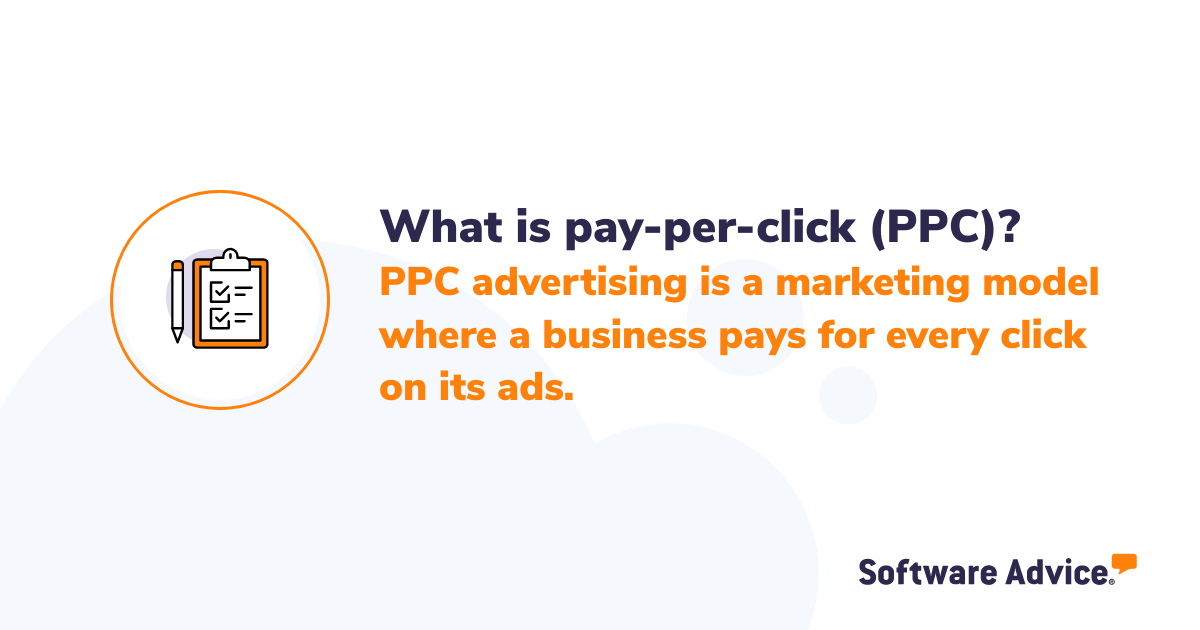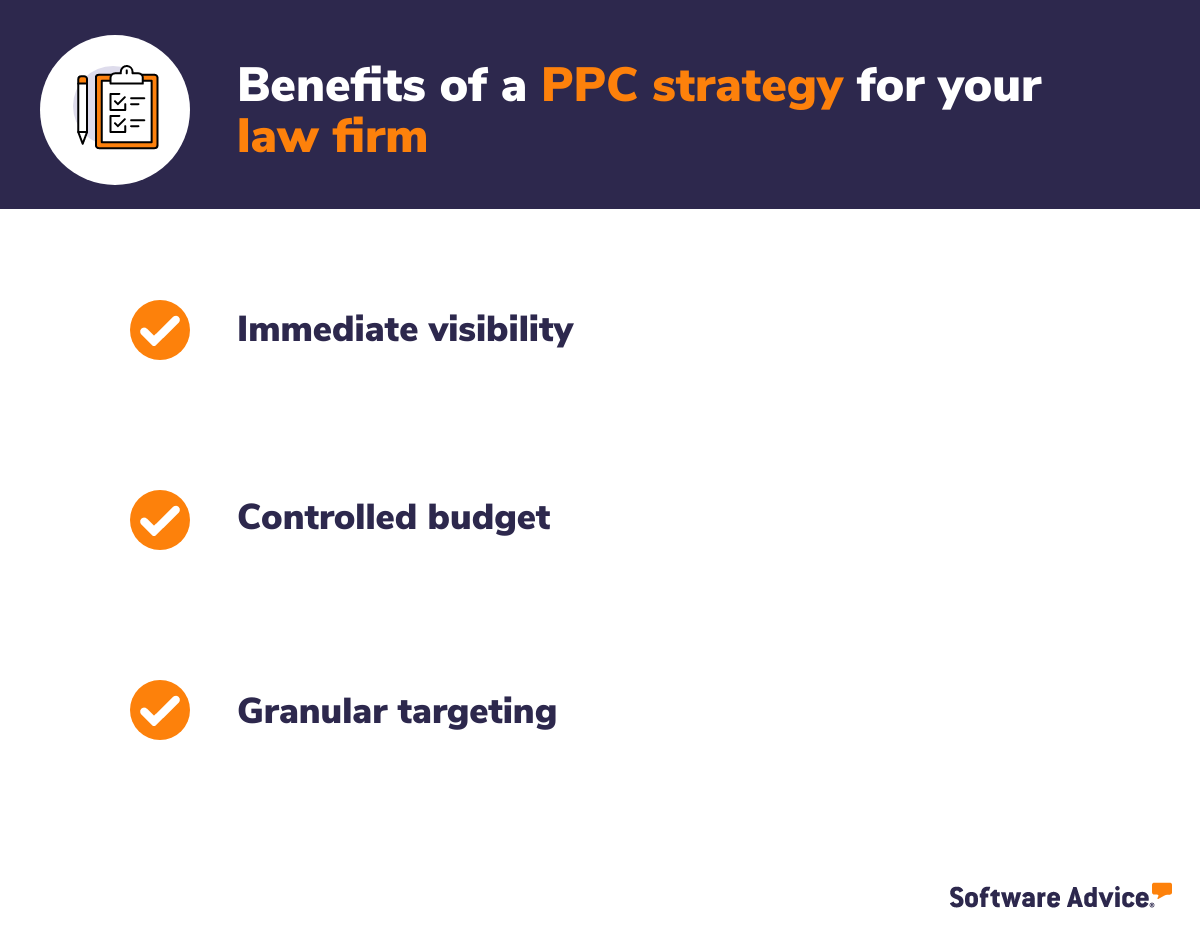Pay-Per-Click (PPC) for Lawyers: How To Grow Your Business
Pay-per-click (PPC) advertising is often one of the first attorney marketing strategies for new, growing law firms. For immediate visibility and highlighting a specific audience, PPC for lawyers is a data-driven strategy with measurable results.
However, it can also feel daunting because of the time involved, the advertising budget needed for testing, and all the logistics of executing a PPC campaign. In this blog post, we'll share tips for effective PPC campaigns, strategies for analyzing success, and common mistakes to avoid.
What is PPC for law firms?
Pay-per-click (PPC) advertising is a marketing model where a business pays for every “click” on its ads. It's different from other types of online advertising, where a company pays based on impressions, engagement, or any other metric type. PPC typically refers to paid search ads on a search engine or on social media.

On Google, PPC for law firms helps you show up at the top of search engine rankings, boosting credibility and visibility with your target audience. On social media, PPC allows you to appear in news feeds, giving you more visibility and name brand recognition with users that regularly scroll through their news feed.
For emerging law firms, PPC advertising allows you to experiment with a fixed budget that only costs you money when a user clicks on an ad. You also get the added benefit of brand awareness and visibility even if someone doesn't click. While organic search engine optimization can take months to see results, PPC campaigns are launched quickly, and with a competitive bidding strategy, your law firm can appear directly in front of your target audience relatively quickly.
Why do you need a PPC strategy for your law firm?
PPC marketing for lawyers is an effective strategy for immediately generating visibility, maintaining a controlled budget, and granularly targeting an audience set.

Immediate visibility
PPC campaigns for attorneys can offer immediate visibility. With the right bidding strategy on keywords or your audience, your business can quickly begin appearing in search results or news feeds. Instead of waiting months to see results, you can rapidly start to see traction within your ideal audience. Plus, this immediate feedback allows you to iterate and experiment with budgets, bidding strategies, keywords, placements, and more.
Controlled budget
PPC ad platforms offer tons of options for controlling PPC bids and budgets. Your law firm can allocate a specific daily, weekly, or monthly budget, and your campaign will stop running once that budget is reached. Plus, PPC platforms allow you to set a budget based on different metrics, so you're able to pay for exactly the type of action you want.
Granular targeting
PPC for attorneys targets a specific audience set within the ad platform. Most ad platforms can get very specific when it comes to targeting options, basing results on a user's search behavior, demographic data, browsing history, and more. You can also experiment with different audience groups to see what performs best. For example, a divorce law firm could experiment with targeting men and women with PPC campaigns to see what yields the most clicks and conversions.
Common PPC terms to know
The world of PPC comes with unique terminology. Here are a few law firm PPC phrases you need to know:
Click-through rate (CTR)
Click-through rate is one of the most important PPC metrics because it's how you pay for your ads. A click-through rate is the percentage of people who click on the ad after viewing it. You want your CTR to be as high as possible.
Cost per click (CPC)
The cost per click is the method of payment for an ad. You can set a maximum CPC of $5 or whatever amount works for you so you're not paying more for an individual click. Ideally, your CPC is as low as possible.
Bidding strategy
Your campaign budget consists of a bidding strategy and individual bids. There are two main types of bidding strategies: manual and automatic. With a manual bidding strategy, you set the ideal CPC yourself. With automatic bidding strategies, you rely on your advertising platform's intelligence to make recommendations, increase or decrease bids, and maximize clicks. Overall, your bidding strategy is based on how much time you can invest in your ad platform.
Cost per acquisition (CPA)
This is the dollar amount it takes for you to acquire a customer. You want your CPA to be as low as possible, meaning you're converting the right customers cheaply.
Return on ad spend (ROAS)
This is an overall metric that measures your total cost spent on ads versus the revenue generated from that campaign. You want your ROAS to be as high as possible because it means you are maximizing every dollar spent. For example, if you spent $100 on ads but generated $1,000 in client business, your ROAS would be an excellent 10x.
Common PPC mistakes that you should avoid
A significant amount of work goes into optimizing your PPC strategy, and it's easy to fall victim to these common mistakes: adjusting bids too quickly, not optimizing landing pages, and ignoring quality scores regarding law firm PPC advertising.
Adjusting bids too quickly
Before you begin tweaking individual bids too much, you want to give your ad time to run and test. If you're adjusting bids up and down too frequently, ad platforms do not have adequate time to show your ad and learn from its performance data. Once you launch your campaigns, let your ad creatives and bids run for at least a week before changing anything. While research shows that an undermanaged PPC campaign does not perform well, tweaking ads too often can also lead to poor results. [1]
Poorly optimized landing pages
Once a user clicks on your ad, they're viewing your landing page. Landing pages should be specific, targeted, and relevant to the exact ad campaign the user was viewing. A generic landing page will often lead to poor conversion rates. Also, avoid making pages hard to read or slow loading. Provide a specific call to action so users know exactly what action you want them to take. You'll quickly discover that sending highly targeted traffic to a poorly converting landing page is a huge waste of money.
Ignoring quality scores
Most ad platforms provide a quality score, measuring your ad relevance, click-through rate, and landing page experience. For example, you might have a poor quality score if CTR is extremely low or users leave your landing page very quickly. Ad quality determines the cost and frequency of how an ad is shown, so make sure your quality score is high.
Effective PPC campaigns for law firms
There are so many different types of PPC campaigns that you can use for your law firm. Take a look at a few ideas below for inspiration on setting up your first campaign.
Geographic areas
Targeting a geographic location is a popular PPC strategy. If your law firm serves a local community, you want to show up at the top of search results when users look for "divorce attorneys near me" or "accident law firms in Austin, Texas." Geotargeting can also beat out competitor law firms for a local audience.
Keyword-specific
When it comes to paid search PPC campaigns, targeting specific keyword phrases—including short-tail and long-tail keywords—gets your firm in front of people searching for a specific solution. For example, this might look like bidding on keywords with a group such as "divorce attorneys," "how to find a divorce attorney," "best divorce attorneys," or "talk to a divorce attorney now."
Audience demographics
PPC ad platforms offer targeted audience demographics such as household income, marital status, job title, location, age, gender, and more. Building PPC campaigns around a target demographic narrows in on an extremely specific subset of people. For example, if your law firm focuses on seniors and estate planning, creating PPC campaigns around age or household income might be a good option.
How to analyze the success of your PPC strategy
There are various metrics and methods for tracking and measuring success in a PPC campaign. While you can perform these analyses manually, many law firms use software to aggregate and measure data, check for advertising fraud, monitor performance over time, or integrate with other customer relationship (CRM) management solutions for a holistic overview.
Tech tip
Start a software search by browsing through a PPC software or legal software directory to explore optimizing PPC campaign success. PPC software can help manage hundreds of PPC campaigns at once on different ad platforms, and legal software can integrate customer information for a more holistic view.
Especially if PPC campaigns are performing well, you might want to invest more budget in them, which makes software even more critical for running effective ad campaigns.
Start a PPC campaign
For law firms just getting started, PPC ads offer immediate visibility, a controlled budget, and granular targeting options. Unlike organic social media, content marketing, or organic SEO, PPC is a quicker way to reach your target audience. Make sure to optimize every aspect of PPC campaigns, from ad copy to landing pages.
Don't forget about mobile optimization, as many users are searching for law firm solutions on their smartphones, and mobile-friendliness is a critical component of an ad quality score.
Once PPC campaigns are successful, leveraging software to manage ads at scale across different platforms is helpful. Explore different tools that fit your budget and needs.
To learn more about advertising your law firm, check out the below resources: